Summary:
- As Meta Platforms, Inc. stock soars unrelentingly upward, it seems the market is forgetting about one key risk.
- Android could soon roll out cross-app tracking changes, and there are big implications.
- This article will also analyze the strength of Meta’s moat and offer a sobering outlook on Threads.
- In the decade ahead, I estimate returns of 5% per annum ~ it’s time to be cautious.
Chip Somodevilla
The Thesis
Given the changes around data privacy, I don’t see the Meta Platforms, Inc. (NASDAQ:META) ad business going back to what it was in 2020 and 2021 anytime soon. It seems the market is missing the implications of this key risk.
I slightly mistimed the bottom of Meta’s stock in 2022:
Meta: This Is The Bottom (Seeking Alpha)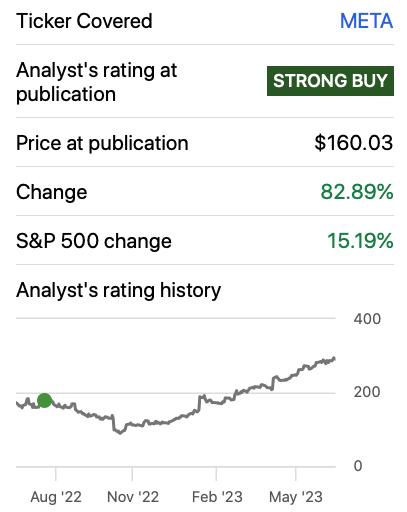
Now, I’m moving to a “Hold.”
Data Privacy – The Elephant In The Room
Let’s rewind to 2021. Meta Platforms stock was booming on the back of its uncanny ability to deliver targeted ads. If you had been searching on Apple’s Safari app for a new car, that same car would often pop up the next day on your Facebook feed. This too-good-to-be-true advertising hit a wall in 2021, when Apple (AAPL) decided to begin prompting users to block cross-app tracking on their iPhones:
Apple’s iOS Update (Vox)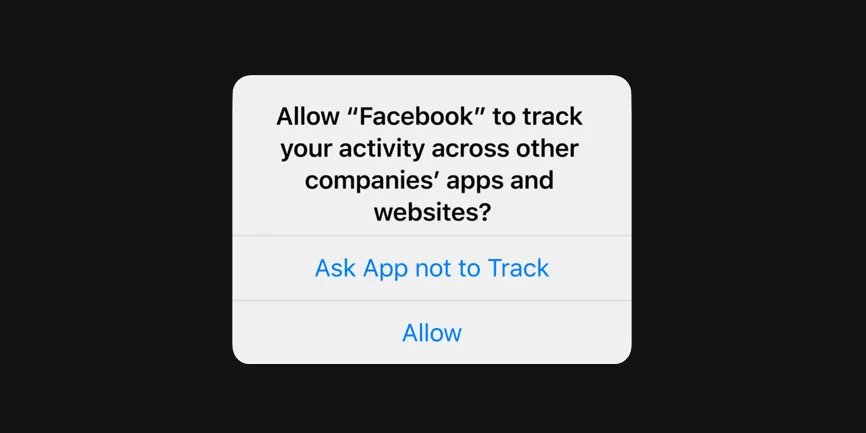
In 2022, Mark Zuckerberg announced that this could cost the company up to $10 billion in revenue. Because Meta had been relying on its cross-app tracking to create targeted advertisements, Meta’s stock collapsed:
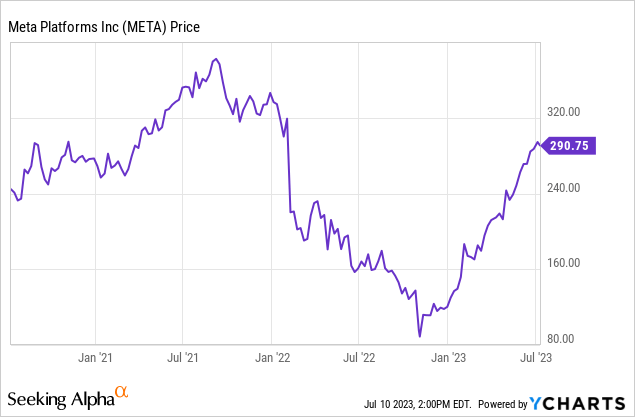
Now, Alphabet (GOOG) aka Google is testing out a Beta to do basically the same thing Apple did. The source said that Android plans to broadly categorize you; for example, “This user is a sports fan,” but specific data will no longer move across apps. These changes could be rolled out to all Android users within the next couple of years. Meanwhile, Android has an over 80% market share globally.
With cross-app tracking on my iPhone turned off, I’ve noticed a precipitous decline in the relevancy of ads I see on Meta’s apps. Back in 2020, ads on Facebook had uncanny relevancy. So the bottom line is that this could impair Meta’s pricing power. As ad effectiveness decreases, businesses decrease their ad spend.
I believe Apple’s privacy changes are the number one reason Meta’s operating income fell off a cliff:
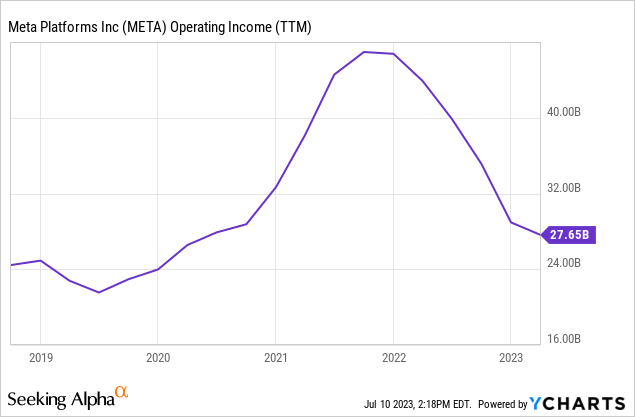
Still, investors seem to be missing what’s going on in the field of data privacy. Europe, Canada, and China have dramatically increased regulation around collecting people’s data, and I don’t see this trend reversing; people like their data private.
Meta is reportedly addressing the issue, but they haven’t shared many details in the past two earnings calls, simply saying:
“We believe our ongoing improvements to ad targeting and measurement are continuing to drive improved results for advertisers.”
Given the developments around data privacy, I would not be surprised if Meta were to miss analyst EPS estimates over the next few years. Currently, analysts have Meta making $15 per share in 2024 and more than $17 in 2025. This looks optimistic to me.
Meta’s Moat Rating
I believe that Meta has a terrific Moat (competitive advantage) around its business, but, looking out 10 to 50 years, I have some concerns.
Meta’s moat becomes apparent when we look at its competitive position against a company like Snapchat, A.K.A. Snap Inc. (SNAP). Meta is just crushing Snapchat with its returns on assets and profit margins:
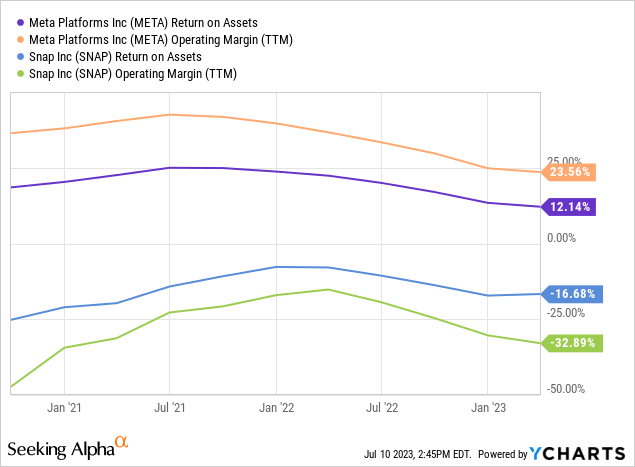
Meta’s scale and “Family Of Apps” make it difficult to compete with. The company’s apps intertwine with one another. You likely use one of them on a daily basis; whether it be Messenger, WhatsApp, Facebook, or Instagram, you’re probably in the ecosystem. It also helps that Meta has a brilliant CEO in Mark Zuckerberg.
The one longer-term issue I see is that when you buy shares in a business like Meta and pay 36x earnings, you need the long term to play out favorably. As Warren Buffett once said, “Investment is the process of putting out money today to get more money back at some point in the future.” Meta now trades at a fancy price.
You can think of Meta’s Facebook and Instagram businesses as being similar to that of the newspaper business back in the 70’s and 80’s. If you’re the only newspaper in town, you have tons of pricing power anytime someone wants to place an ad in your paper. But Meta hasn’t always been the only newspaper in town:
Social Media Timeline (BroadbandSearch.net)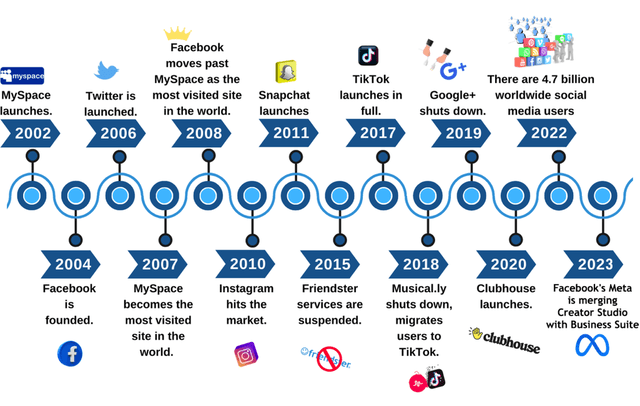
Myspace was the king of social media in the early 2000’s. Then, Facebook took over. Next, Instagram came along. Thankfully for shareholders of Facebook, CEO Mark Zuckerberg made the brilliant move to acquire Instagram in 2012. But, what if Instagram had decided not to sell out? Would Facebook have become the Myspace of old? Would Instagram have crushed Mark Zuckerberg? I guess we’ll never know, but you can see the risk at play here. Investors must ask themselves, who will be the next king of Social Media? This is why it is so difficult to predict the duration of Facebook and Instagram’s cash flows.
Given the relatively low friction consumers face when switching from a platform like Facebook or Instagram to another social media platform, I’m giving Meta a moat rating of “C+.”
Growth Drivers And Threads
Meta’s Instagram Reels is now firing on all cylinders, and I continue to see Messenger and WhatsApp as valuable assets that have the potential to be monetized further. As for the Metaverse, I’m not a big virtual reality fan, but that doesn’t mean it won’t appeal to many. And, it may turn out to have some interesting use cases. After the continued reset from data privacy impaired ads, I think Meta will have substantial pricing power for ads on Facebook and Instagram.
Share buybacks are another driver of EPS growth, although they will be less effective now at a $760 billion market cap (36x earnings) than they were at a sub $300 billion market cap (12x earnings) in 2022. This means the same dollar amount of buybacks will increase your ownership percentage by a smaller amount.
Shares outstanding vs. P/E ratio:
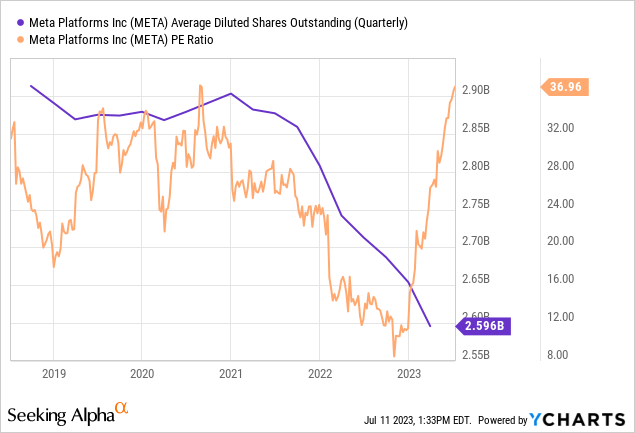
Moving on to Threads, Twitter’s struggled with profitability for a long time, and I don’t see increasing competition in this space as a positive for near-term profitability. It’s impressive that Threads has quickly reached 100 million users vs Twitter’s 238 million (as of last summer); if Threads is capable of stealing Twitter’s user base completely and incorporating Meta’s ads business, I think it could be modestly profitable in the next 3 to 5 years (perhaps it will surpass Twitter’s 2019 peak earnings of $1.5 billion), but I wouldn’t count on it. Apparently, “Twitter is threatening to sue Meta over ‘systematic, willful and unlawful misappropriation’ of Twitter’s trade secrets and IP.” We’ll see what happens.
Long-term Returns
Meta’s stock has rallied big-time, but its earnings are down. Given my outlook around Meta’s moat, as well as the industry privacy changes, I have Meta forecasted to return just 5% per annum in the decade ahead:
| Current EPS | $8.06 |
| Compound Annual Growth Rate | 13% |
| Year 10 EPS | $27.40 |
| Terminal Multiple | 17.5x |
| Year 10 Price Target | $480 |
| Annualized Returns | 5% |
I would upgrade Meta to a “Buy” at $222 per share, implying returns of 8% per annum.
In Conclusion
Up more than 80% since my first article on Meta, I’m now moving to a “Hold.” Investors should not overlook the colossal changes happening around the world in data privacy. Meanwhile, Meta’s stock has swung wildly from extreme pessimism to optimism. Warren Buffett has described Mr. Market’s swings like so:
“At times he [Mr. Market] feels euphoric and can see only the favorable factors affecting the business. At other times, he is depressed and can see nothing but trouble ahead for both the business and the world.”
I hope this article helps you see both the favorable and unfavorable factors affecting Meta.
Until next time, happy investing!
Analyst’s Disclosure: I/we have no stock, option or similar derivative position in any of the companies mentioned, and no plans to initiate any such positions within the next 72 hours. I wrote this article myself, and it expresses my own opinions. I am not receiving compensation for it (other than from Seeking Alpha). I have no business relationship with any company whose stock is mentioned in this article.
Seeking Alpha’s Disclosure: Past performance is no guarantee of future results. No recommendation or advice is being given as to whether any investment is suitable for a particular investor. Any views or opinions expressed above may not reflect those of Seeking Alpha as a whole. Seeking Alpha is not a licensed securities dealer, broker or US investment adviser or investment bank. Our analysts are third party authors that include both professional investors and individual investors who may not be licensed or certified by any institute or regulatory body.
